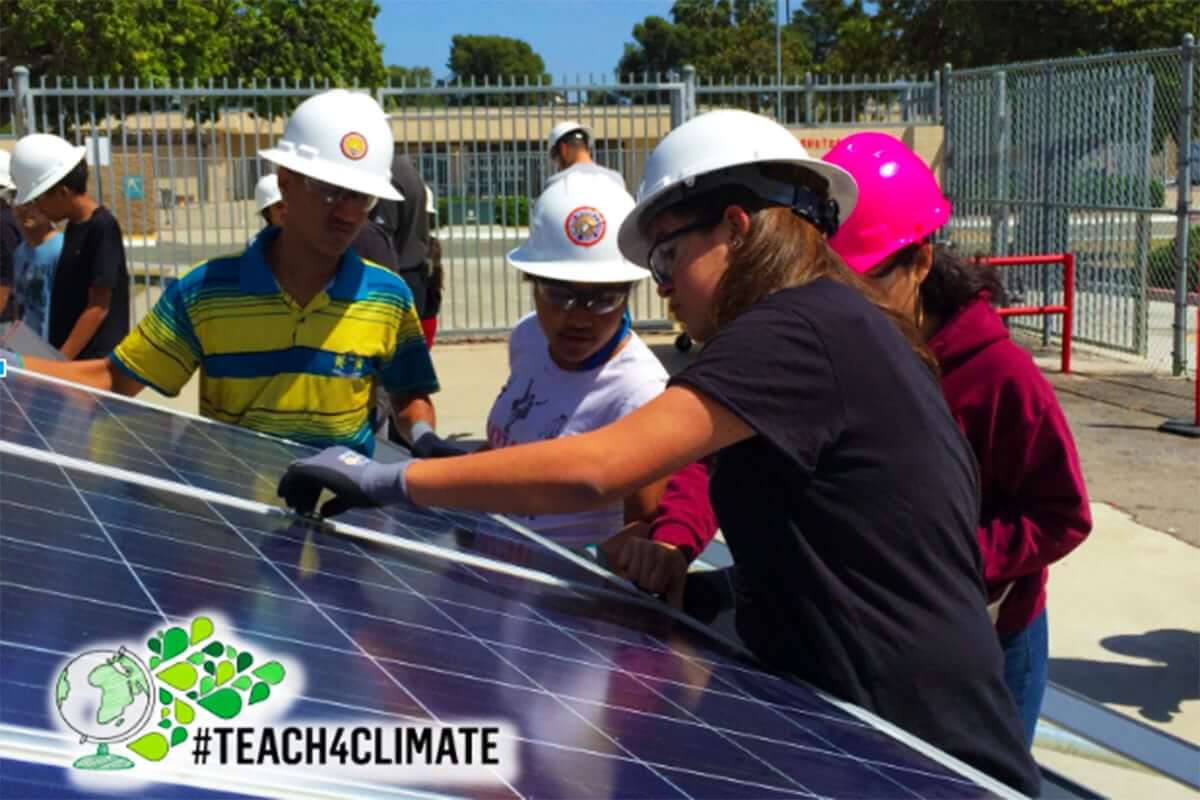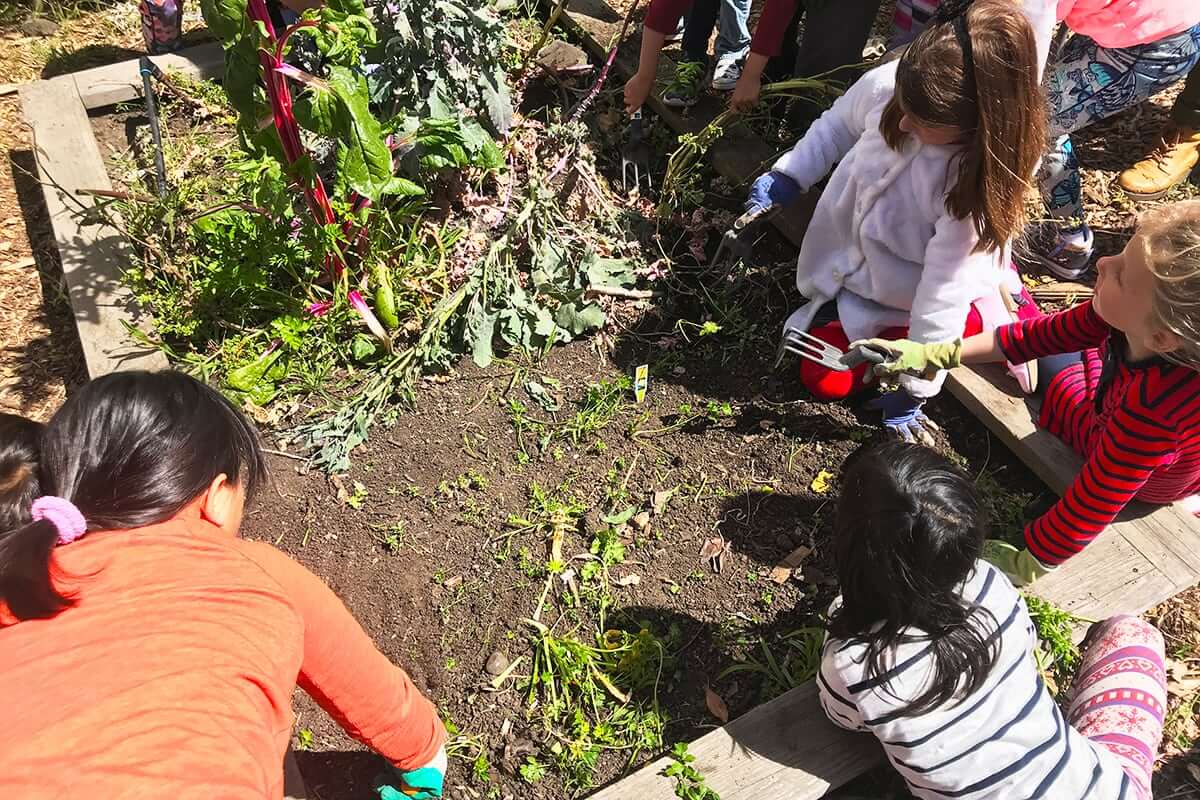#Teach4Climate is a social media campaign organized by a flotilla of partners who are inspiring educators to prepare students and communities to be part of the solution to climate change. Today’s youth are the first generation to feel the impacts of climate change and possibly the last that can do something about it. These partners are working together to empower young people and communities around the world to engage and take action.
Why does climate change education matter?
As the United Nations Framework Convention on Climate Change states in Article 6, education contributes to the solutions being developed to respond to the challenges and opportunities presented by climate change. “The solutions to climate change are also the paths to a safer, healthier, cleaner and more prosperous future for all. To see this and to understand what needs to be done requires a sharp and sustained focus on education, training and public awareness in all countries and at all levels of government, society and enterprise.”
Some of the key points on why climate change education matters are:
- Long-term, independent records from weather stations, satellites, ocean buoys, tide gauges, and many other data sources all confirm that our nation, like the rest of the world, is warming. Scientists who study climate change confirm that these observations are consistent with significant changes in the Earth’s climatic trends. (U.S. National Climate Assessment, 2014)
- Over the course of the 21st century, climate scientists expect the Earth’s temperature to continue increasing, very likely more than it did during the 20th century. Two anticipated results are rising global sea levels and increasing frequency and intensity of heat waves, droughts, and floods. These changes will affect almost every aspect of human society, including economic prosperity, human and environmental health, and national security. (USGCRP Climate Literacy, 2009)
- Climate change will bring economic and environmental challenges as well as opportunities, and citizens who have an understanding of climate science will be better prepared to respond to both. (USGCRP Climate Literacy, 2009)
- Society needs citizens who understand the climate system and know how to apply that knowledge in their careers and in their engagement as active members of their communities. (USGCRP Climate Literacy, 2009)
- Climate change will continue to be a significant element of public discourse. Understanding the essential principles of climate science will enable all people to assess news stories and contribute to their everyday conversations as informed citizens. (USGCRP Climate Literacy, 2009)
Education: A Key to Climate Action
The Global Climate Action Summit (GCAS) will bring leaders and people together from around the world to “Take Ambition to the Next Level.” It will be a moment to celebrate the extraordinary achievements of states, regions, cities, companies, investors, community-based organizations, and citizens with respect to climate action.
The GCAS includes a call to climate action to all young people. The #Teach4Climate campaign is an example of such a call to action. Led by Alliance for Climate Education, California Science Teachers Association, CLEAN Network, Climate Generation: A Will Steger Legacy, Lawrence Hall of Science, National Wildlife Federation, NOAA Climate Education, Pulitzer Center, Strategic Energy Innovations (SEI), Ten Strands, The Wild Center, and others, this campaign is focused on those who directly impact students everyday — teachers and educational systems and organizations.
Young people are one of the largest demographics in the world. According to the World Bank, 42% of the people on Earth are under the age of 25. Climate education is now a necessary foundation for those young people. In order to tackle the complex issue of climate change, we need leaders with the skills, knowledge, and passion to push for and innovate solutions.
Young people are already taking the lead, demanding ambitious action on climate change and rallying a global youth climate movement. The #Teach4Climate coalition supports them all the way — on the road to San Francisco and beyond.
We are excited to join forces and support young people by giving them a voice and an opportunity to lead in San Francisco at the GCAS, and to see the actions it will ignite and strengthen. We know there are solutions, and we are committed to working together to build a low carbon and resilient climate-friendly world.
#Teach4Climate Initiatives
During the month surrounding the GCAS, we are calling on young people, educators, and educational organizations to share their climate solutions, tell their climate stories, and engage in the GCAS and beyond.
Leading up to the GCAS Climate Generation, @ClimateGenOrg, launchedthe #Teachclimate365 campaign asking teachers to pledge to teach climate change year-round, in all subjects, and to join the #TeachClimate Network for instructional support and monthly virtual meetings.
September 11 Accelerating Climate Action: A Workshop for Community, Business and Education Leaders: This workshop will be a forum for community, business, and education leaders to showcase and explore models that build social will and capacities needed to assist communities and businesses in reaching the net zero emissions by 2050 to achieve the Paris Agreement’s aspiration for a 1.5 degree world. Participants will work together to develop options for integrating climate change education, community engagement, and workforce development activities into local climate action plans with the goal of accelerating and supporting place-based climate solutions.
September 12 Education: Key to Long-term Climate Action Success: This one-day event will focus on elevating the importance of education as a systemic, strategic tool to advance climate action and identify how sectors across the climate movement can work together to support policies, initiatives, and actions that advance this goal. The day will feature inspiring youth and adult speakers highlighting the power of education and activism, and feature an engaging youth performance.
September 13 ACE Livestream Event: Teachers can join via Zoom for 60 minute live webinars for their classes. Tentatively scheduled for September 13 at 10:00 am PDT.
September 13 Higher Education Leadership on Carbon Pricing: Join leaders from higher education institutions spearheading carbon pricing action as they showcase solutions and impacts to date. Through presentations and discussion, participants will explore best practices in implementing carbon pricing on campus and examine ways institution leaders engage in public education and debate. This event is co-hosted by Yale University, Swarthmore College, Second Nature, and the Carbon Pricing Leadership Coalition, which co-organize the Higher Education Carbon Pricing Task Team.
September 13 Newsela Teacher Feature: Global Climate Action Summit Resources: Elementary and secondary teachers can learn how they can use Newsela content to engage students in discussions about environmental issues. The webinar is scheduled for September 13 at 3:00 pm PDT.
September 14 Climate Action Giving Pledge: GloCha Global Challenges Foundation New York and partners are organizing a meeting at the Bay Aquarium at which resource holders will have a chance to explore with leading climate action leaders and youth representatives which philanthropy and social impact investment interventions would deliver the highest impact and coordinate actions in a synergistic manner.
Resources for Climate Action through Education
A community of educational and science partners have organized resources and programs for those who want to teach climate and energy science, backed by some of the most experienced professional educators, scientists, and engineers. These resources provide teachers with tools to educate students about climate and energy science, develop the skills to take action, and then reevaluate teaching methods. Explore the growing list of resources here, and #Teach4Climate now!




One Response
Actually Armstrong’s premise appears to be fairly clear, that being that a little discussed, allegedly valid, difficult to alter historical record (the hunger stones) clearly document patterns of decreased river flow. Of course there have always been dry years and wet years over time, though MA suggests that the fawning attribution of Europe’s current weather to catastrophic anthropogenic climate change in the current recent period (a blink of an eye in geological terms) of observed warming, is probably the wrong conclusion to draw, and he’s right. For what it’s worth, his observations on the periodicity of the hunger stones appearances is fascinating; and his weaving in volcanism’s impact on global climate (historically) is spot on for the most part, particularly for a laymen (my assumption there). I happen to hold dual appointments in physics and climate science at a large west coast university and am working with an international team on solar impacts/contributions to observed climate on earth, so I’m fairly well versed on the subject at hand. Academic suppression of research not supportive of the political climate change model is still alive and well, though the dam is about to break for reasons I’m not able to share in detail here. Happen to be a freestone dry fly guy and have followed you guys for a few years now; keep dipping your toes in the science waters, it’s a nice change from hero pics and vids (with the occasional flagrant fish mishandle).